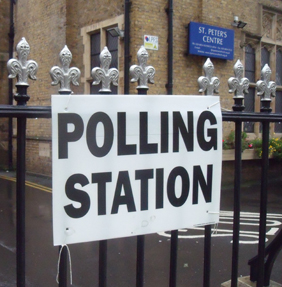Further steps are necessary to stamp out electoral corruption; across voter registration fraud and error, postal voting fraud, impersonation, bribery, treating, undue influence and intimidation, concluded an official review of electoral fraud by senior Conservative MP Sir Eric Pickles.
What he termed a ‘worrying and covert spread of electoral fraud and state of denial by some bodies’ threatened the UK’s good reputation, he warned.
Sir Eric said that he feared trust-based system is becoming no longer tenable. He write: “To retain the integrity of our democracy, we need to introduce more rigour into the processes we use, to see more clarity and proactivity from institutions such as the police in upholding the system. We need to act now to avoid further major instances of fraud …”
As for what to actually do, the report suggested greater powers for returning officers and the police to take action to address unwanted behaviour in and around polling stations (such as to be able to set up ‘cordons sanitaire’ and to ensure that the police have the powers they need to disperse and deal with people who are causing a nuisance or leading people to feel intimidated outside a polling station. Such cordons were in place at Tower Hamlets in east London in 2015, after what a court termed ‘thuggish conduct at polling stations’ in 2014. The taking of pictures and use of cameras (including camera phones) in polling stations should be made illegal to prevent voters being intimidated, according to the report. Staff in polling stations should enforce the rule that voters go to the booth individually. Among other ideas, the Government should consider the options for electors to have to produce personal identification before voting at polling stations. The report pointed to ‘clear links between electoral fraud and associated financial or immigration fraud’.
Police view
West Midlands Police Assistant Chief Constable Gary Cann supported the review, which was commissioned last year by former Prime Minister David Cameron, and gave evidence to the inquiry.
National Police Chiefs’ Council (NPCC) Lead on Electoral Malpractice and Electoral Fraud, ACC Gary Cann said: “Electoral fraud is a criminal offence which the police take extremely seriously. While proven cases are relatively rare, it is important that voters have confidence in the democratic process.
“We work closely with partners – including the Electoral Commission, Crown Prosecution Service, political parties and local authorities – to detect crimes and prevent them from occurring. Every police force has an election SPOC (Specific Point of Contact) and the College of Policing published new Authorised Professional Practice on policing elections in 2014. This is updated on a regular basis.”
For the 65-page report, visit https://www.gov.uk/government/uploads/system/uploads/attachment_data/file/545416/eric_pickles_report_electoral_fraud.pdf.










